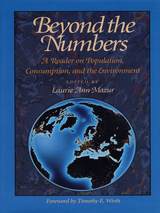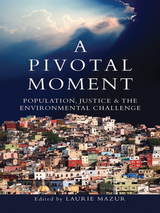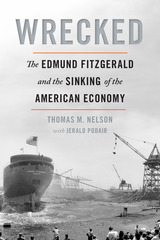
Beyond the Numbers presents a thought-provoking series of essays by leading authorities on issues of population and consumption. The essays both define the poles of debate and explore common ground beyond the polarized rhetoric.
Specific chapters consider each of the broad topics addressed at the International Conference on Population and Development held in September 1994 in Cairo, Egypt. The essays are supplemented by sidebars and short articles featuring more-impassioned voices that highlight issues of interest not fully explored in the overviews.
As well as providing a sense of the difficulties involved in dealing with these issues, the essays make clear that constructive action is possible.
Topics covered include:
- the interrelationships between population, economic growth, consumption, and development
- the history of population and family planning efforts
- gender equality and the empowerment of women
- reproductive rights, reproductive health, family planning, health and mortality


The result of that work, Bounce Forward: Urban Resilience in the Era of Climate Change, defined resilience as “the capacity to anticipate, plan for, and mitigate the dangers—and seize the opportunities—associated with environmental and social change.” It emphasized the need to think critically about resilience, to ask what is being made resilient, to what changes or threats, and for whose benefit.
Much has happened in the decade since Bounce Forward was published. So, in 2024, The Kresge Foundation commissioned Island Press to produce an updated report. The goal was to revisit the framework developed in 2015, assess progress toward making that vision a reality, and—especially after the 2024 presidential election—consider prospects for advancing resilience in the current political climate. To that end, Island Press interviewed 30 individuals working on diverse aspects of resilience, including several who were consulted for the original report.
Realizing Resilience: Toward a Fairer, Greener Future finds that the original framework presented in Bounce Forward remains an aspirational guide to community resilience. The updated report documents progress, setbacks, and opportunities in several key areas—climate resilience, equity and climate, energy, climate and health, and cities and the built environment. It finds that the current moment poses unprecedented challenges as well as promising pathways to resilience. And perhaps most importantly, Realizing Resilience uncovers welcome glimmers of hope, even in these dark and uncertain times.

This volume, a collection of articles and op-eds published over the last decade, offers a banquet of answers to that question.
The contributors to Resilience Matters span many perspectives: they are community leaders and policy wonks, academics and elected officials. Yet, they agree that resilience is not about “bouncing back” to the status quo. Today, the destabilized climate poses unparalleled risks to human well-being, and rising inequality means those risks are not equally shared. That’s why we must “bounce forward” to a future that protects us from climate change while distributing risks—and opportunities—more equitably.
That future is already under way. Here, you can catch glimpses of what it could look like: community-owned clean energy that keeps the lights on when the grid goes down; strategies to safeguard communities from flooding and fire; energy efficiency and renewable power that bend the curve of greenhouse gas emissions; policies to protect those at greatest risk from extreme weather and to support the leadership of those on the front lines of climate disruption.
The coming years will certainly test our collective resilience. But, even in these polarized times, people are rising to the great environmental and moral challenges before us. In these pages, they show us how to build a greener, fairer, and more resilient future.
READERS
Browse our collection.
PUBLISHERS
See BiblioVault's publisher services.
STUDENT SERVICES
Files for college accessibility offices.
UChicago Accessibility Resources
home | accessibility | search | about | contact us
BiblioVault ® 2001 - 2025
The University of Chicago Press









